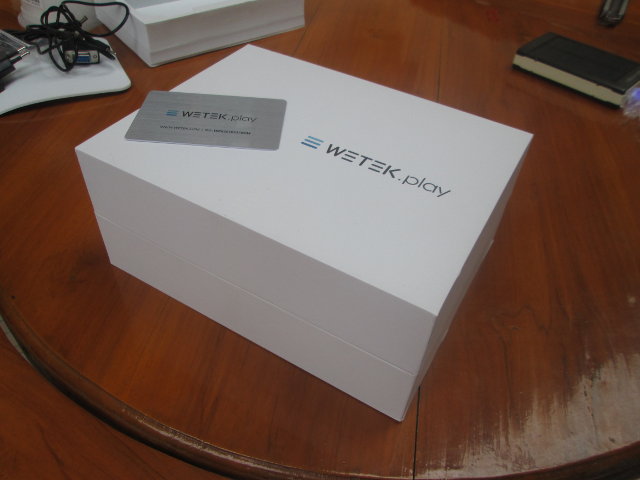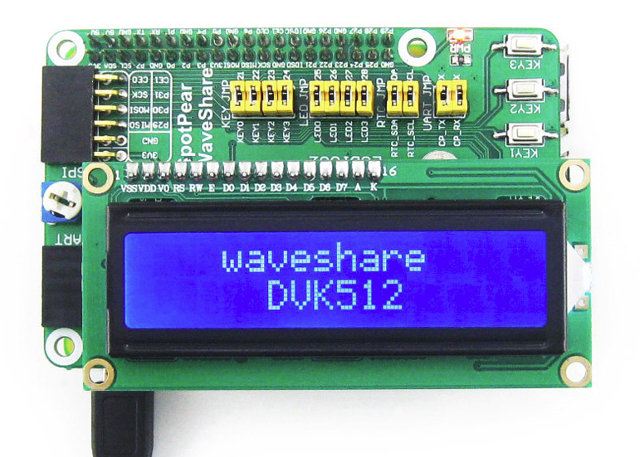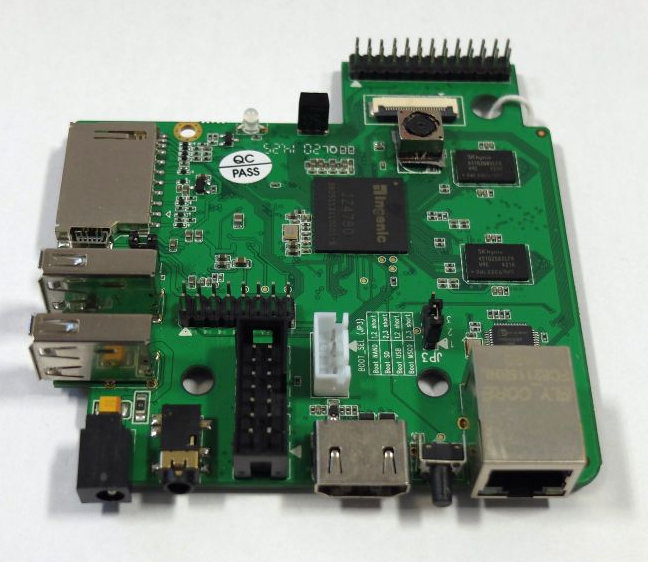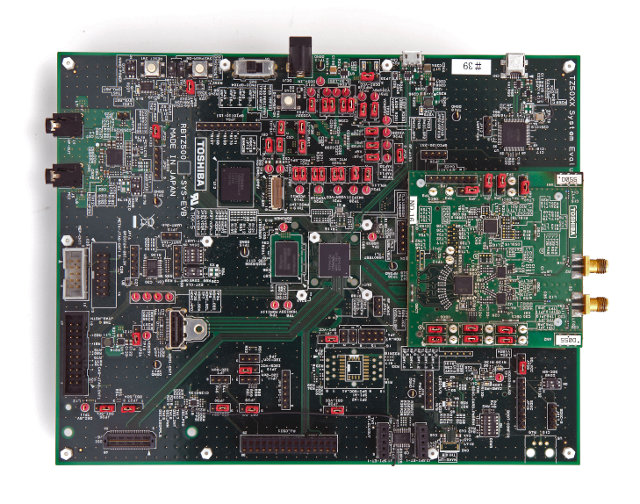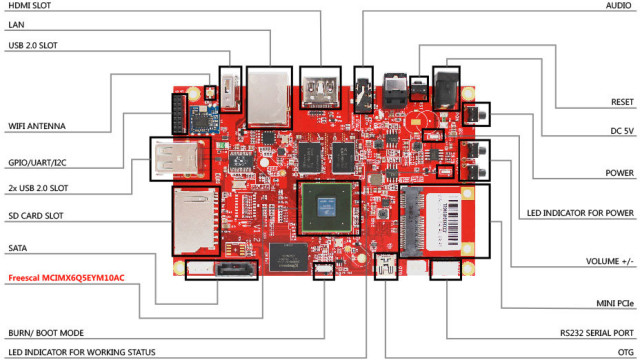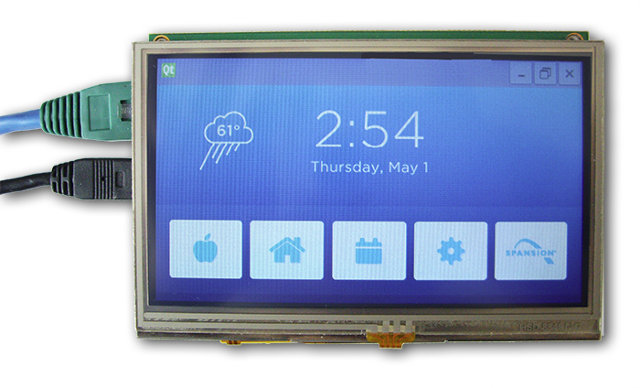WeTek Electronics, a company based in Hong Kong, has sent me an Android TV powered by Amlogic AML8726-MX dual core Cortex A9 processor. Nothing new here, but I was very very interested in reviewing it because it includes a DVB-S2 tuner, and on top of their stock Android firmware, the company provides various Android and Linux firmware files such as CyanogenMod, ParanoidAndroid, OpenELEC, Linux with Enlightenment desktop environment, Lubuntu 14.04 and so on. Today, I’ll list the hardware specifications of the device, show some unboxing pictures and video, and as usual, open the device to see what’s inside. I’ll provide a full review in one or two more posts. WeTek Play Specifications Apart from the DVB-S2 tuner are the serial port, the hardware specifications sound familiar: SoC – Amlogic AML8726-MX dual core Cortex A9 @ 1.5GHz with Mali-400MP GPU System Memory – 1GB DDR3 Storage – 4 GB NAND flash […]
Waveshare DVK512 Kits For Raspberry Pi Model B+ Include RTC, Sensors, LCD Display, and More
Beaglebone (Black) expansion boards are called capes, Minnowboard ones are lures, and Raspberry Pi model B+ add-on boards can be HATs (HArdware on Top). When I found a kit for the Raspberry Pi model B+ on DealExtreme, based on Waveshare DVK512 add-ons board I thought it might have found a Chinese HAT, but unfortunately it is not compliant with HAT board specifications as it misses an EEPROM,and the dimensions are not the correct one either. Nevertheless, the kit, as well as extra accessories such as a 3.2″ LCD display, can still be interesting. The kit on DX comes with the following items: DVK512 expansion board that connects to the 40-pin Raspberry Pi B+ header and features PCF8563 RTC chip with battery, an on-board USB to TTL chip for debugging via micro USB, a character LCD interface, connectors for modules connected via UART, SPIO, I2C or GPIO, various jumpers and user […]
MYIR ARM9 Linux Development Boards & Computer-on-Modules Powered by Freescale i.MX28 Processor
MYIR MYD-IMX28X development boards and MYC-IMX28X CPU modules had been announced in May 2014, but I’ve just found out about them via the company’s newsletter. The CoMs are powered by Freescale i.MX28 ARM9 processors (i.MX283 or i.MX287), feature 128 MB RAM, 256 MB Flash, and connect to a baseboard to make the development boards. Target applications include smart gateways, human-machine interfaces (HMIs), handheld devices, scanners, portable medical, experimental education as well as other industrial applications. MYC-IMX28X CoMs MYC-IMX28X computer-on-module specifications: Processor – Freescale i.MX283 or i.MX287 ARM926EJ-STM processor up to 454MHz with 128KB SRAM, 128KB ROM, 1280 bits of OCOTP ROM, 16KB/32KB I and D Cache System Memory – 128MB DDR2 SDRAM Storage – 256MB NAND flash, 128KB SPI flash Connectivity – On-board Ethernet PHY Connectors – 2x 1.27mm pitch 2 x 40-pin SMT male expansion connectors with access to Ethernet – Up to 2 Ethernet (two for i.MX287, one for i.MX283) USB […]
MIPS Creator CI20 Development Board Powered by Ingenic JZ4780 SoC
There are plenty of ARM based development boards running Linux and Android, but with MIPS it’s a different story. Microchip does have some affordable development board powered by their MIPS MCUs, but these don’t have the hardware specs to run Linux based operating systems, and Ingenic Newton Platform for wearables can run Android and Linux, but it appears to be reversed to companies with virtual no documentation. There are some MIPS platform running OpenWRT on hardware such as routers or Wi-Fi boards, but these can’t be considered fully supported development boards. But Imagination Technologies is trying to make MIPS more relevant, first by launching Prpl developers’ community, and MIPS Creator CI20 development board powered by Ingenic JZ4780 dual core MIPS32 (Xburst) core processor with PowerVR SGX540 GPU should soon be available with complete documentation and source code. Let’s go through the hardware specifications first: SoC – Ingenic JZ4780 dual core […]
Toshiba TZ5000 ApP Lite Media Player Development Kits Run Android 4.4 and Ubuntu Linux
Toshiba has recently announced two development kits powered by their TZ5000 ApP Lite SoC featuring two ARM Cortex A9 cores, PowerVR SGX540 GPU, PowerVR VXD395 GPU, an optional 4GB MLC NAND, and Ensigma C4500 Wi-Fi baseband engine into a single chip solution that targets Over-The-Top (OTT) tuners and IP media boxes, wearable devices, digital signage, thin clients, and more. The first development kit, RBTZ5000-6MA-A1, is a full size board that supports Ubuntu, the other one, RBTZ5000-6MA-A1, is an HDMI stick form factor board running Android 4.4. Toshiba RBTZ5000-2MA-A1 Board (Ubuntu) RBTZ5000-2MA-A1 Starter Kit specifications: SoC – Toshiba TZ5011XBG dual core Cortex A9 processor @ 1.0 GHz with PowerVR VPU and GPU, and Ensigma C4500 Wi-Fi baseband engine System Memory – DDR3L-1600 Storage – 8GB eMMC (external) + MicroSDXC Connectivity – Wi-Fi 802.11a/b/g/n/ac 2×2 MIMO (via Ensigma C4500), Bluetooth 4.0. Ethernet is available via a daughter board connected to ADB. USB […]
OpenELEC Ported to TBS 2910 Matrix Board Supports DVB T/S/C, DVR and IPTV Server Functions
TBS 2910 Matrix, also simply called TBS Matrix, is a board powered by Freescale i.MX6 Quad SoC with 2GB RAM, 16 GB eMMC, and supporting various TBS USB DVB tuners. The company provides images for Ubuntu, Android, and something called Matrix TV. The company also releases the source code for the boards, and two OpenELEC developers, namely Ovi and Vpeter, though it could be a nice idea to port OpenELEC to TBS Matrix, and that’s exactly what they did. The video demo below shows online video streaming via 1channels add-on, which can be done with any Android or Linux media player running XBMC or OpenELEC, but the second part is more interesting, as it shows Live TV from a Cable TV USB tuner connected to the board. Ovi also confirmed the system supports DVR, and you can also use the board as a micro IPTV server. DVR function is supported […]
Emcraft Systems Introduces IoT Devkit with LCD Display Powered by Freescale Vybrid VF6 SoC
Emcraft Systems has launched a IoT development kit based on on their Freescale Vybrid VF6 SoM featuring MVF61 SoC with a Cortex A5 MPU and a Cortex M4 MCU, and connected to a baseboard (IOT-BSB-EXT) with various connectors (USB, Ethernet, …) as well as a 4.3″ LCD (480×272 resolution) with touchscreen. The kit targets IoT gateway applications where a GUI (Graphical User Interface) and/or HMI (Human Machine Interface) are required. Vybrid IoT devkit specifications: SoC/Memory/Storage – Via Vybrid VF6 SoM with Freescale MVF61NN151CMK50 (No Security), or Freescale MVF61NS151CMK50 (with Security), 128 MB DDR3, Up to 512 MB NAND Flash, and 32 MBytes dual QSPI Flash Storage on Baseboard – micro SD card slot Display – 4.3″ 480×272 LCD with touch panel connected to the back side of the baseboard. Connectivity – 10/100M Ethernet USB – 2x micro USB OTG ports, 1x micro USB for debugging and/or power Debugging – 20-pin […]
Linux 3.16 Released
Linus Torvalds announced the release of Linux Kernel 3.16 over the week-end: So nothing particularly exciting happened this week, and 3.16 is out there. And as usual (previous release being the exception) that means that the merge window for 3.17 is obviously open. And for the third time in a row, the timing sucks for me, as I have travel coming up the second week of the merge window. Many other core developers will be traveling too, since it’s just before the kernel summit in Chicago. So we’ll see how the next merge window goes, but I’m not going to worry about it overmuch. If I end up not having time to do all the merges, I might delay things into the week of the kernel summit, but I’ll hope to get most of the big merging done this upcoming week before any travel takes place, so maybe it won’t come […]


